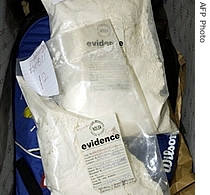2007年VOA标准英语-West Africa's Drug Circulation Increases, Worry(在线收听)
Dakar
18 June 2007
West Africa is increasingly becoming a transit point -- as well as a stopping point -- for illicit drugs. So far, local governments have proven incapable to combat the trend. VOA's Nico Colombant reports from our West Africa bureau in Dakar.
In divided Ivory Coast, music blares from a popular and market-filled area of Abidjan, known as Inchallah, which means "God Willing."
What is known locally as a "fumoir" was recently demolished, near these stalls, by angry residents. A "fumoir" is a place where drugs like cocaine, amphetamines, morphine and heroin are sold and consumed.
One of the residents who took part in the vigilante action says he had seen police exchanging money and drugs with local dealers.
United Nations Special Representative to the region Ahmedou Ould Abdallah says the dealers could have had ties with cartels from outside West Africa.
"For the last few months, we are aware of a massive traffic in hard core drugs, probably from Latin America," he said.
Abdallah believes drug trafficking is the biggest threat of instability in a region still recovering from civil wars and poorly-organized elections.
"It comes to some states who are so fragile that, despite their good faith and their willingness to do something, they just cannot. They do not have the capacity," he said. "Some of their institutions are, no doubt, corrupt, but we cannot blame them for the capacity."
One well known transit point is Guinea-Bissau, where drugs flown in and out by small planes are warehoused on its many, scattered islands and coastal inlets.
Boats are also used. About two years ago, after a ship sunk, local fishermen said they had scooped up packages of white powder that were floating in the ocean. They say they used the packages as food seasoning or fertilizer.
Recently, seized cocaine - with a street value of more than $30 million or about 10 percent of Guinea Bissau's gross domestic product - disappeared from government offices.
A government official says he believes police destroyed the seized drugs, but says he did not see it, for himself. Another U.N. official says police may well have destroyed white cement, instead of the drugs.
Abdallah says it is difficult to pin-point how much drug money is being made in West Africa, by whom and for what purposes.
"The money related to drug trafficking is so important that it may serve as a cover for any legitimate or illegitimate activities," he said. "Our concern is the region is so vast."
He points to Burkina Faso, Mauritania and Niger as other trafficking hubs. He says most of the drugs transit to Europe, where a strong euro and more cocaine use is fueling the trade.
But getting drugs across borders can be a complicated process - even in Africa.
Last month in Mauritania, authorities seized more than 600 kilograms of cocaine they say had been flown from Venezuela through Brazil to the economic capital, Nouadhibou.
Investigators say helicopter pilots were waiting to take the drugs from a villa to Morocco, before moving it on to Spain. The son of a former head of state, a political party leader and a top businessman are suspected in this case.
A spokesman for the U.S Drug Enforcement Administration, Rusty Payne, says there is evidence criminal gangs in Latin America are working closely with criminals in many West African countries.
"These criminal organizations are establishing ties with African criminal organizations in places like Ghana, Nigeria, Senegal and Togo," he said. "And, what they are doing is they are taking advantage of less-developed governments in those countries where they have a chance to more effectively struggle drugs to Europe."
Payne says European criminal networks are also involved in West Africa.
 |
| Cocaine is presented as evidence in a case at the Federal High Court in Lagos, Nigeria (File) |
An official from the Ivory Coast-based Center for Regional Training In the Fight Against Drugs, Jean-Claude Koffe, says so-called human "mules," who carry drugs - sometimes inside their own bodies - are also used in West Africa. He says traffickers are ingenuous and change methods quickly. He says drug mules can be women and young children.
A Congolese woman with 108 cocaine capsules inside her body recently died in Benin, after one of the capsules exploded.
European and Lebanese criminals are known to transport drugs in their private cars.
Koffe says all kinds of drugs transit through the region. He says these are also coming from and going to Asia.
American drug agent Payne warns the drug problem could be debilitating to West Africa, if local governments do not get proper tools and assistance to fight back.
"To these countries that are developing, nothing could be more damaging. Drug trafficking is a huge international problem. It involves global solutions," he said. "And, at the same time, countries that are having to deal with this, that are trying to develop and establish a rule of law, they do not need this. This does nothing but hinder them. And, it presents probably the greatest threat."
Government officials from throughout the region have been pleading for help at recent conferences, saying their countries are becoming victimized by the drug trade, through no initial fault of their own.
They fear competing drug gangs will slowly extend their influence throughout the government, the army and police, threatening to turn West African countries into violent "narco-states."